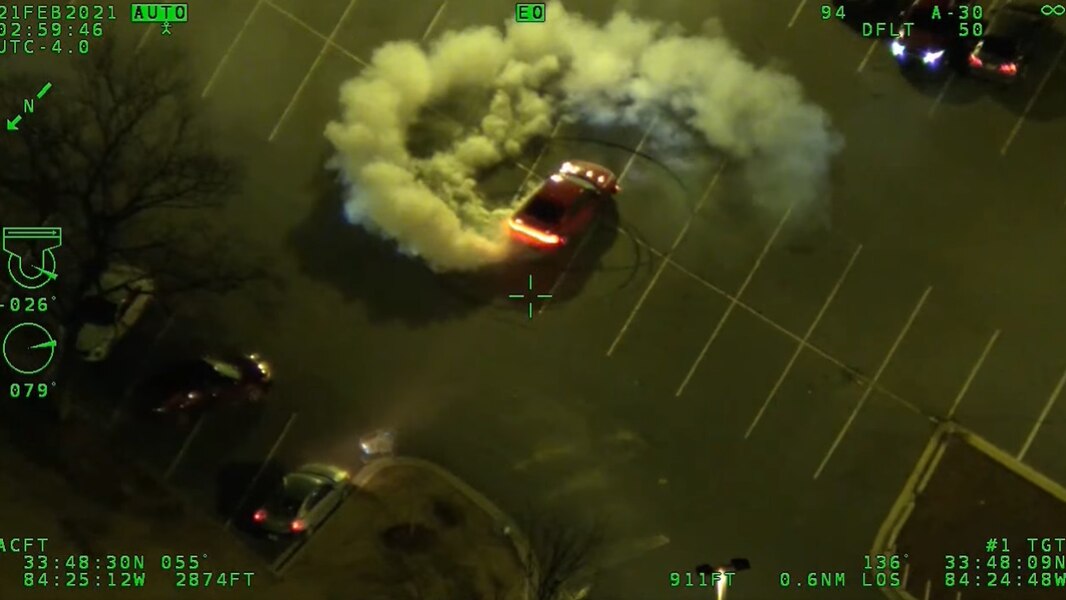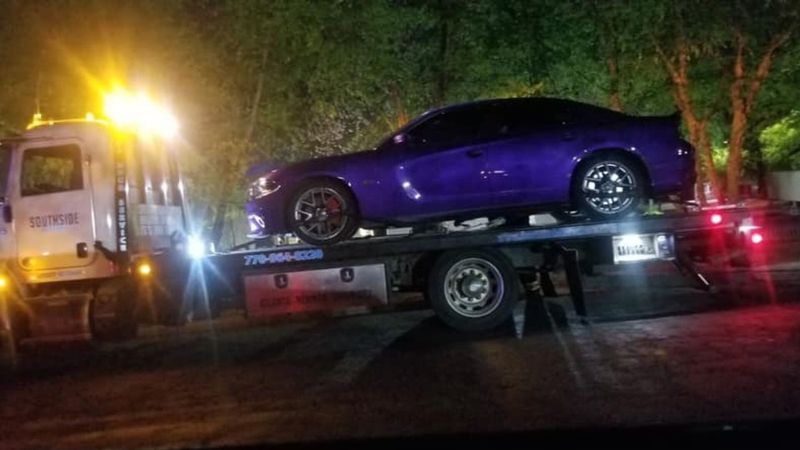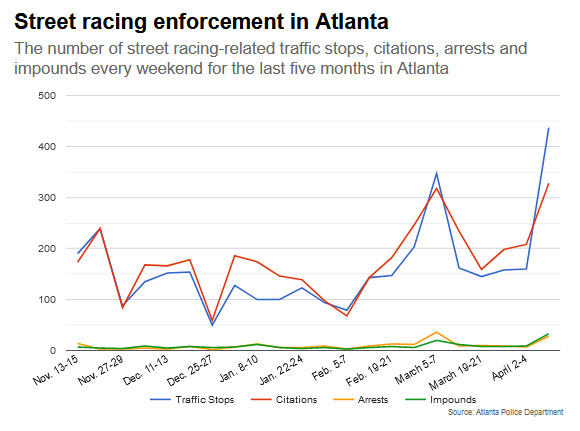
A police helicopter image of a car doing stunts in a Kroger parking lot in late February. (Screenshot via Atlanta Police Department)
By J.D. Capelouto
It’s the the middle of the night, and high above an Atlanta Kroger a police helicopter tracks dozens of cars entering the parking lot. Police had been following the group on the belief they were involved in “street racing activity.”
“Now there’s probably, I would say, at least 50 vehicles in this parking lot,” an Atlanta Police Department officer says. “I haven’t seen any laying drag or doing doughnuts as of yet.”
Then, a red Dodge Charger hits the accelerator and starts doing loops, leaving skid marks on the parking lot. White smoke surrounds the car, video taken from the helicopter and posted to social media shows.
“They’ve started doing doughnuts,” the officer watching from above says. Within minutes, police cruisers in the area enter the parking lot. One man, a 22-year-old, was arrested and charged with reckless driving and laying drag. The Charger was impounded.
Under recently passed legislation, police stings like the one at this northwest Atlanta Kroger in late February could result in higher penalties for people arrested on street racing-related charges. But critics question whether the new statewide measure will curtail the illegal activity, and worry it will disproportionately target people of color.
State lawmakers passed the street racing bill at the end of this year’s legislative session, with bipartisan support in the House and Senate. It also has the endorsement of Gov. Brian Kemp, who publicly backed the bill during a February press conference, though he has not said when he might sign it into law. The governor’s office said Wednesday it is reviewing the bill.
The new measure follows attempts by police departments and city governments in metro Atlanta to crack down on “street racing,” a catch-all term that involves dangerous driving in parking lots or on roads, or doing stunts in front of a cheering crowd. Authorities say the activity, which saw an uptick in 2020 as the pandemic emptied parking lots and streets, endangers drivers and pedestrians and the noise is a nuisance for nearby residents.
The measure, House Bill 534, allows authorities to suspend the licenses of some violators for up to a year and calls for penalties as high as $5,000. It creates the offense of “reckless stunt driving” and allows authorities to seize cars that are involved. Repeat offenders could be charged with a felony and face additional prison time.

A car is impounded in the city of South Fulton following what authorities said was a street racing bust.
“What it does is it really targets the people who are resistant to stopping,” Atlanta interim police Chief Rodney Bryant said about the new law. “I think that it will be very helpful in deterring this type of activity.”
Atlanta is one of several cities across metro Atlanta that have passed laws to increase penalties for street racing, though the new state law will likely supersede many of the local ordinances. The Atlanta City Council passed a measure in August that levied fines of up to $1,000 against people who attend to watch a street racing-related event, even if they’re not in a car. Atlanta also requires people arrested for street racing to see a judge before they can be released on bond, usually within 24 to 48 hours of their arrest.
Police departments have also poured more resources into enforcement, as evidenced by Atlanta’s deployment of a police helicopter to track suspected street racers. Some recent stings have gone much further. In Clayton County, authorities arrested 102 people in mid-March after getting reports that cars were doing doughnuts in a Sam’s Club parking lot. About a quarter of those arrested were juveniles, some as young as 11.
Last weekend in South Fulton, over 80 people were arrested and 45 cars were impounded in what police said was a street racing bust.
Critics of the state’s new bill include civil rights advocates and those in Atlanta’s car scene. They are skeptical new laws will be effective in actually preventing people from street racing and worry enhanced punishments will only lead to more young auto enthusiasts having criminal records.
“I don’t think it will deter people,” said Devin Barrington-Ward, an ally of the “car enthusiast” community in Atlanta. “It’s a revolving door and nothing has changed.”
He acknowledged laying drag or racing on public streets can be dangerous, but said meetups among car fans mostly involve people parked in a lot and showing off their rides. He worries about the possible unintended consequences if police crack down on such events, where Barrington-Ward said reckless, unsafe driving is relatively rare.
“It’s also an issue of race,” said Barrington-Ward, an Atlanta resident and the founder of the Black Futurists Group, a social justice organization. “We know the majority of those who are in the car enthusiast community are Black and brown.”
An Atlanta Journal-Constitution analysis of Atlanta police data shows how the department has ramped up enforcement over the last five months. It also suggests the activity has not died down following the winter months — even after the Atlanta City Council heightened penalties.

The number of street racing citations and arrests increased in late February into March; over one three-day span in early March, the weekend Atlanta hosted the NBA All-Star Game, Atlanta police made 36 street racing-related arrests and issued over 300 citations.
The new law would be similar to Georgia’s DUI statutes and includes punishments for anyone who “promotes or organizes” drag racing events, said state Sen. Emanuel Jones, a Democrat whose district includes parts of DeKalb and Henry counties. The bill does not include penalties for simply watching a drag racing event.
“The bill sets up not just the takedown of those that are racing, but is also set up to take down the organization as well,” Jones said, adding that he is hopeful the car seizure and license suspension provisions will be effective in preventing repeat offenders.
In Midtown Atlanta, Courtney Smith has grown frustrated by the noise and possible danger posed by street racing. The president of the Midtown Neighbors’ Association, she welcomes the passage of the statewide bill but urged courts to pursue the upgraded punishments.
“The police can cite offenders all day long,” Smith said, “but until guilt is proven and punishment is applied to the crime, there is no deterrent.”
But advocates like Barrington-Ward and Marissa Dodson, the public policy director at the Southern Center for Human Rights, have urged lawmakers to work with car enthusiasts instead of just ramping up enforcement. They worry seizing cars could be harmful to those arrested and their families, and have suggested metro Atlanta governments explore ways to allow drivers to gather and do stunts legally and safely.
That could come with its own legal and logistical issues, though similar programs have been instituted around the country. Police departments from Florida to California have hosted events in which the public can race officers on a drag strip. And police in the Detroit area have shut down a portion of a street for a popular legal street racing event every year.
“Being as punitive and harsh as you can doesn’t actually help the situation,” Dodson said, “because the issues are much deeper than that.”
Read the original story on AJC.com.











